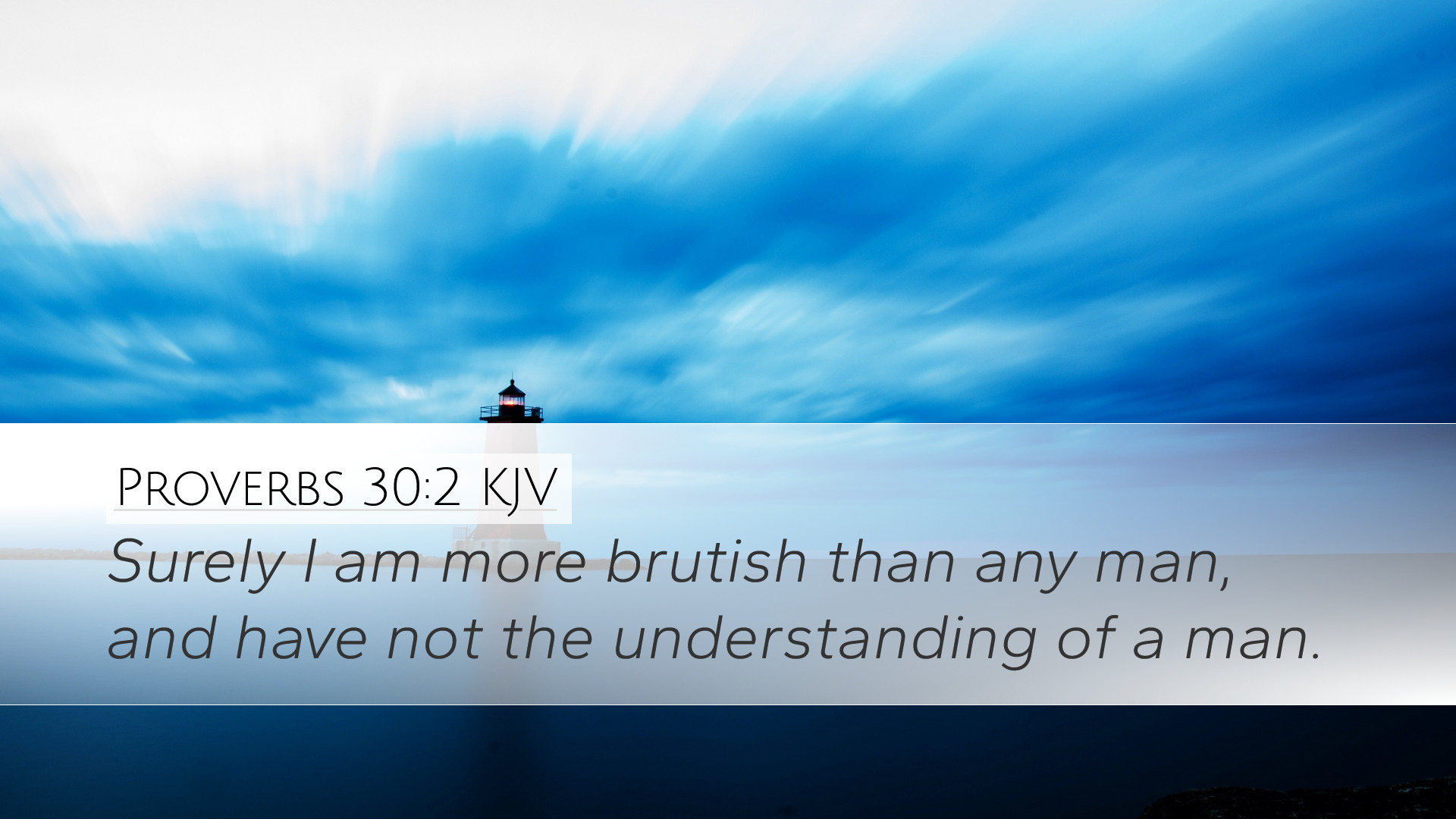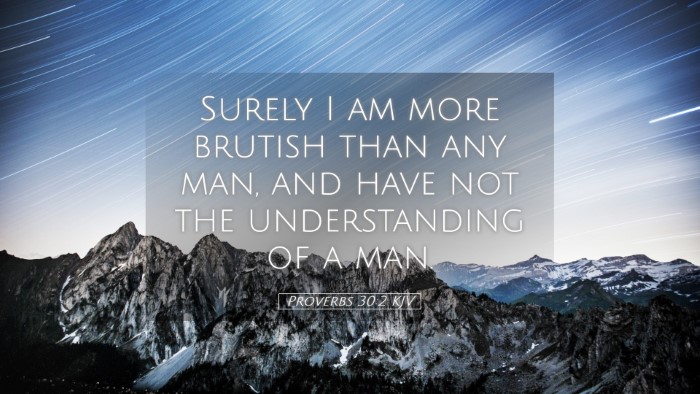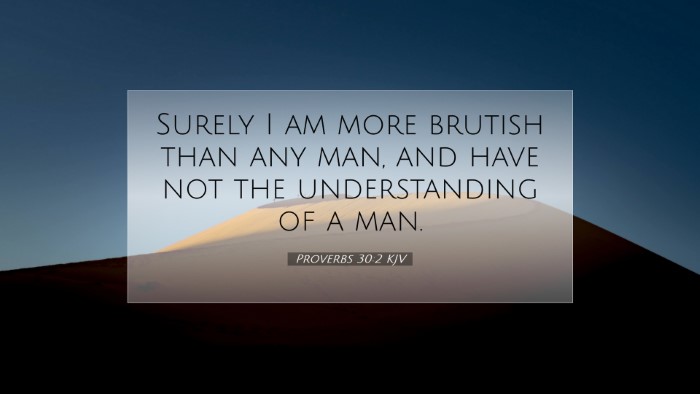Proverbs 30:2 Commentary
Verse: “Surely I am more brutish than any man, and have not the understanding of a man.”
Introduction
The Book of Proverbs is a compilation of wisdom literature that serves to guide individuals in the pursuit of a righteous life. In chapter 30, a shift occurs as Agur, the author of this chapter, reflects on his own inadequacies and the nature of his understanding. The verse in question, Proverbs 30:2, contains profound insights about humility, human limitations, and divine wisdom. This commentary synthesizes insights from notable public domain sources, providing a meaningful exploration for pastors, students, theologians, and Bible scholars.
Analysis of the Text
Agur begins by acknowledging his own lack of wisdom and understanding. This admission is significant, especially within the context of biblical literature, where wisdom is often sought and revered. The word "brutish" signifies a state akin to that of brute animals, suggesting a rawness and unrefined nature of humanity. The term emphasizes the speaker's perceived deficiency compared to the God-given insight that is sought throughout the Proverbs.
Insights from Matthew Henry
Matthew Henry, in his well-regarded commentary, emphasizes the vital importance of humility in the pursuit of wisdom. He notes that Agur’s acknowledgment of his brutishness serves as a corrective to human arrogance, reminding readers that true wisdom begins with the recognition of one’s own ignorance. Henry writes:
“The first step towards a wise understanding is to know ourselves, to see our own ignorance, and to feel our own need of instruction from God.”
Henry also suggests that this verse reflects a broader theme within Proverbs regarding the fear of the Lord, which is the beginning of knowledge (Proverbs 1:7). Such fear is not a paralyzing fear but rather a reverent acknowledgment of God’s supreme wisdom and authority. Therefore, Agur’s self-assessment serves to amplify the greatness of God’s understanding in contrast to human frailty.
Insights from Adam Clarke
Adam Clarke's commentary provides additional depth to Agur's proclamation. He interprets "brutish" as indicative of a lack of enlightenment and divine wisdom that transcends mere animal instinct. Clarke argues that Agur's awareness of his own limitations is crucial for anyone seeking wisdom. He elaborates:
“To know the height of our folly is the first step to wisdom; and all men may attain this knowledge, by observing their own hearts and lives.”
Clarke further remarks on the necessity of divine guidance, asserting that wisdom cannot be achieved through human effort alone. It is through submission to God and His teachings that one may rise above the brute nature referenced by Agur. Clarke's emphasis lies in the idea that self-knowledge leads to the desire for enhanced understanding through divine revelation.
Insights from Albert Barnes
Albert Barnes adds another layer to the understanding of this verse by examining the biblical notion of humility. He notes that Agur’s declaration openly contrasts human wisdom with divine wisdom, reinforcing the idea that no person can claim complete understanding. Barnes states:
“Human wisdom is often foolishness with God. In humility, we must recognize our limits and seek understanding from the source of all wisdom.”
Barnes suggests that this verse serves as a profound testimony to God's omniscience and the frailty of human perspective. He encourages believers to look towards God for insight, rather than relying solely on human intellect, thus fostering a deeper relationship with the divine through humility and reflection.
Theological Implications
The examination of Proverbs 30:2 opens pathways for numerous theological discussions. It poses essential questions about the nature of knowledge and the role of humility in spiritual growth. This verse invites individuals to reflect on their limitations and the necessity of divine revelation in understanding truth. It serves as a reminder that:
- 1. Human Limitations: Every believer must confront their limitations and recognize the need for God’s wisdom.
- 2. The Relationship between Wisdom and Humility: Genuine wisdom begins with a humble heart, acknowledging the extent of human frailty.
- 3. The Contrast between Divine and Human Wisdom: Understanding the vastness of God’s knowledge invites respect and reverence.
Practical Applications
The application of Proverbs 30:2 reaches beyond intellectual understanding and into the fabric of daily life. For pastors, students, and scholars, the implications of this verse can be transformative:
- 1. Personal Reflection: Regular self-examination and acknowledgment of ignorance can foster personal and spiritual growth.
- 2. Sermon Preparation: Emphasizing the need for divine wisdom in preaching can remind congregations of their need for God.
- 3. Educational Settings: In academic pursuits, maintaining a posture of humility can lead to deeper discoveries and understanding.
Conclusion
Proverbs 30:2 encapsulates a significant theme of humility and the recognition of one’s own limitations in the pursuit of wisdom. Agur’s perspective serves as an enduring reminder that human understanding is limited, and it is only through communion with the divine that one can acquire true insight. By synthesizing the insights of Matthew Henry, Adam Clarke, and Albert Barnes, this commentary offers a multifaceted view that enriches the reader's comprehension of both the text and its broader implications. In a world rife with the pursuit of knowledge, believers are called to remember the foundational truth of dependence on God’s wisdom.


